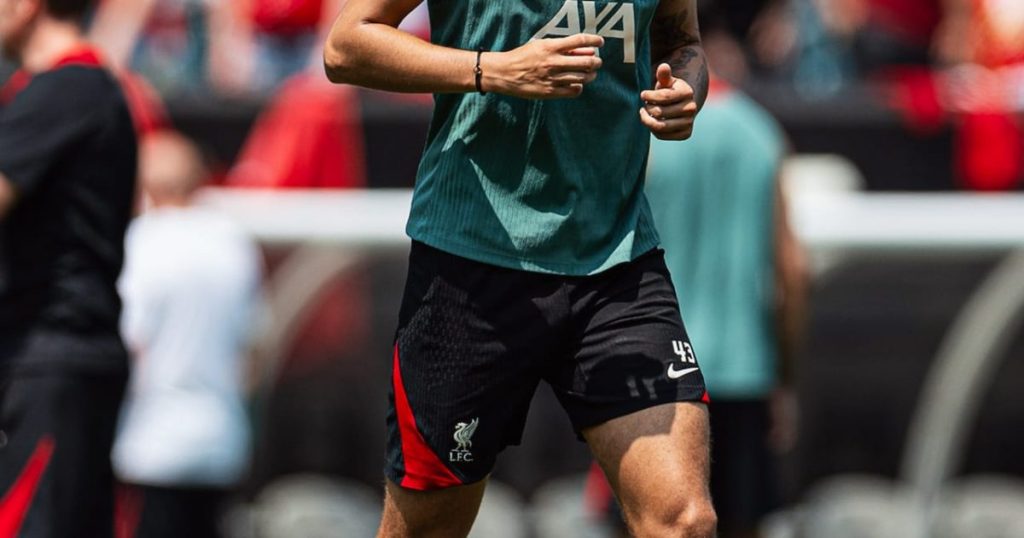Stefan Bajcetic, the promising young midfielder from Liverpool, has embarked on a new chapter in his footballing journey, joining Spanish club Las Palmas on loan until the conclusion of the 2024-25 season. This temporary move, confirmed by Liverpool in a statement released on a Friday night, follows Bajcetic’s spell at Austrian powerhouse Red Bull Salzburg during the first half of the current campaign. The loan transfer, subject to international clearance, offers the 20-year-old Spaniard an opportunity to further hone his skills and gain valuable experience in La Liga, Spain’s top-tier football division. While his initial loan to Salzburg saw him make 19 appearances, including six in the prestigious Champions League, this switch to Las Palmas marks a return to his homeland, presenting a fresh challenge and the chance to contribute to a different footballing environment.
Bajcetic’s journey to this point has seen him rise through the ranks at Liverpool, making his senior debut for the Reds in August 2022. Since then, he has featured in 22 matches, even managing to find the back of the net once. This loan move to Las Palmas signals Liverpool’s commitment to nurturing his talent, providing him with consistent playing time and the platform to develop further. The timing of the loan announcement coincided with Liverpool’s preparations for their Premier League clash against Bournemouth, highlighting the dynamic nature of the football transfer market, with player movements happening amidst the ongoing season. The January transfer window, a crucial period for clubs across Europe, enables teams to fine-tune their squads and address specific needs, whether it be bolstering attacking options, strengthening the defense, or adding depth to the midfield.
The January transfer window, officially open from January 1st to January 31st in the English Premier League, offers a condensed timeframe for clubs to negotiate and complete deals. Unlike the summer transfer window, which provides a more extended period for strategizing and maneuvering, the January window often becomes a whirlwind of activity, characterized by last-minute negotiations, dramatic announcements, and the occasional surprise transfer. Clubs are motivated by a variety of factors during this period, ranging from injury crises and unexpected dips in form to the need for tactical adjustments and the pursuit of specific player profiles. The window becomes a strategic battleground where clubs weigh the risks and rewards of making swift moves, mindful of the inflated prices and limited availability of players that often characterize the mid-season market.
The pressure to secure reinforcements often stems from the desire to improve league standings, whether it be challenging for the title, securing a coveted European competition spot, or avoiding the dreaded threat of relegation. The intensity of the January window is amplified by the media spotlight, with every rumor, negotiation, and completed transfer scrutinized and analyzed. While some managers embrace the January window as an opportunity to inject fresh talent into their squads, others adopt a more cautious approach, preferring to make strategic adjustments rather than undertaking wholesale changes. The limited time available for integrating new players into existing team dynamics and the potential disruption it can cause often make managers wary of making hasty decisions.
The January transfer window represents a high-stakes period for clubs, demanding astute judgement from managers and sporting directors as they navigate the complex landscape of player availability, transfer fees, and the immediate impact a new signing can have on team performance. The mid-season window also provides opportunities for players seeking more playing time or a change of scenery, as well as for clubs looking to offload players who are no longer part of their long-term plans. This interplay of motives creates a dynamic and unpredictable environment, making the January transfer window a captivating spectacle for football fans and pundits alike.
In Stefan Bajcetic’s case, his loan move to Las Palmas presents a mutually beneficial arrangement. It provides the young midfielder with an opportunity to gain regular first-team football in a competitive league, while allowing Liverpool to monitor his progress and assess his readiness for a more prominent role in the future. The loan spell will serve as a valuable learning experience for Bajcetic, exposing him to different tactical approaches, playing styles, and the demands of a new league. Ultimately, the success of this loan move will be measured by his development as a player and his ability to contribute positively to Las Palmas’ campaign.














